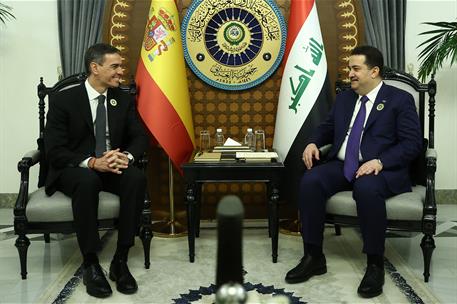The Government of Spain facilitates early retirement for arduous and hazardous employment
Council of Ministers - 2025.5.28
Moncloa Palace, Madrid
Pablo Bustinduy with the Minister for Education, Vocational Training and Sports, Pilar Alegría, the Minister for Home Affairs, Fernando Grande-Marlaska, and the Minister for Inclusion, Social Security and Migration, Elma Saiz (Pool Moncloa / Jose Manuel Álvarez)
The Council of Ministers has approved the procedure for establishing the reduction coefficients that will allow the retirement age to be brought forward in the Social Security system for the most arduous and dangerous jobs.
The Minister for Inclusion, Social Security and Migration, Elma Saiz, stated that some jobs become particularly hard in the last years of working life, and that the data support that there are jobs associated with above average work-related accidents and occupational diseases. In the framework of social dialogue, the Government agreed with trade unions and employers' organisations to design a procedure based on objective criteria so that workers in these activities can bring forward their retirement.
Objective criteria for early retirement
Notably, the Government has today approved objective criteria, based on scientific evidence, to determine which occupations are of an exceptionally arduous or hazardous nature, and which suffer from high morbidity or mortality rates. Where in such cases it is not feasible to improve working conditions, workers may retire earlier than normal. The change, according to Elma Saiz, "brings us closer to policies approved by European countries such as France, Austria and Italy, but above all it is a step forwards in social justice".
The minister pointed out that one of the great advances of the regulation is that it exhaustively defines the nature of the activities that will be eligible for these coefficients, according to their severity, toxicity, dangerousness and unhealthiness. Hardship includes elements such as exposure to noise or the ongoing use of physical force; toxicity refers to exposure to physical, chemical or biological agents; hazardousness refers to activities most likely to cause occupational accidents or an occupational disease; and unhealthiness refers to exposure to an environment likely to be harmful to health.
The Minister for Inclusion, Social Security and Migration, Elma Saiz, at the press conference after the Council of Ministers | Pool Moncloa / Jose Manuel Álvarez
To prove that the circumstances justifying the application of the reduction coefficients exist, a formula has been established based on objective indicators: the incidence of temporary incapacity, deaths and permanent incapacity, and the average duration of these processes. Elma Saiz indicated that a report will subsequently be drawn up to also measure other factors such as common or professional contingencies, age and sex, job rotation and the size of the company.
Business, trade union and self-employed organisations and, in some cases, the public administrations themselves will be responsible for requesting the application of the reduction coefficients to a specific group. The ministry will seek reports from various bodies, and an evaluation committee with representatives from the ministry and the social partners will report on the recognition of the coefficients. Elma Saiz said that their application will lead to an increase in Social Security contributions, in accordance with "the principle of fairness and contributory justice of our system".
The minister pointed out that this new procedure does not affect those in occupations where it is already possible to bring forward the retirement age, such as seafarers, miners and aircrew, among others.
Assessment of the first regularisation of self-employed people
During her speech, the minister also presented the balance of the first regularisation of contributions for self-employed workers, which shows that more than 3.7 million people have regularised their contributions in accordance with their real income in 2023.
The minister recalled that prior to the regularisation, more than 80% of the self-employed chose to contribute at the minimum rate, which led to unfair situations and pensions that were up to 37% lower than those of other regimes. To resolve this situation and achieve a fairer model, the Government established a new contribution model in 2022 that responds to three principles: contributory fairness, equity and sustainability.
The Minister for Inclusion, Social Security and Migration, Elma Saiz, at the press conference after the Council of Ministers | Pool Moncloa / Jose Manuel Álvarez
Under the new system, each self-employed person must pay contributions on the basis of their annual net income, choosing a provisional contribution base that can be adjusted during the year. At the end of the tax year, the General Treasury of the Social Security compares the information and issues a definitive regularisation that may involve a refund of contributions, the requirement to pay an additional amount, or the maintenance of the base. This strengthens the system of long-term social protection.
The regularisation process began in October 2024, once the personal income tax campaign closed, and according to the minister, the contributions of almost 4 million self-employed workers have been reviewed, of which 2,122,000 have not needed to be adjusted as they were within their corresponding bracket or in situations that could not be regularised. The contributions of 1,581,847 people have been subject to regularisation. Of these, 796,304 contributed below the corresponding bracket and have had to pay the differences; 461,822 had contributed above their bracket and have received a refund, and 323,721 did not declare their income.
Elma Saiz added that the Government has strengthened the channels of face-to-face and telephone support for the self-employed, and has developed digital tools to accompany this group in the regularisation process and in the resolution of possible incidents.
The Minister for Inclusion, Social Security and Migration informed that in the coming weeks, once the first regularisation has been completed, the Government will convene to agree on the new contribution tables for the coming years. The current one will be in force until 31 December 2025.
Grants for activities of social interest
The Council of Ministers has approved two measures of a social nature that the Minister for Social Rights, Consumer Affairs and 2030 Agenda, Pablo Bustinduy, has described as a "true reflection of what Spain is, a supportive, inclusive country with a firm aspiration for equality and social justice".
The Minister for Social Rights, Consumer Affairs and 2030 Agenda, Pablo Bustinduy, at the press conference after the Council of Ministers | Foto:Pool Moncloa /Borja Puig de la Bellacasa
First, the Executive authorised the early call for applications for subsidies for activities of social interest for 2025. The minister explained that the amount in question is €94 million from the state section of personal income tax, to which €375 million will be added in the coming weeks from the regional section, managed by the respective territorial administrations. In total, €471 million, 12% more than the previous year, will be allocated to programmes to combat social exclusion and poverty, children, training, the right to culture and family reconciliation.
Pablo Bustinduy highlighted the anticipated nature of the call, "a historic demand of the third sector in Spain". This will allow more time for the preparation and evaluation of programmes, and thereby "greater synergy with public policies".
The minister also stressed that the €471 million are the result of the "solidarity and empathy" of the 50% of taxpayers who tick the box for social purposes on their income tax returns. According to Bustinduy, who praised the work of social organisations, which are attacked by "authoritarian and hateful discourses that promise a false notion of order", this choice enables the financing of a multitude of initiatives that improve the lives of millions of people in Spain.
Promotion and welfare of assistance dogs
Second, the Council of Ministers regulated the conditions, training and identification of assistance dogs. The objective, according to the head of Social Rights, Consumption and 2030 Agenda, is to "combine the maximum protection of animal welfare with the promotion of what has already become an essential element to promote the personal autonomy and independent living of hundreds of thousands of compatriots".
Pablo Bustinduy explained that until now the status of these animals was governed by a 1983 decree that only considered visual impairment. The new regulation extends to all types of disability and covers other types of dogs such as warning dogs, medical and sound alert dogs, and assistance dogs for people with autistic spectrum disorder, among others. According to the minister, the access, circulation and permanence of assistance dogs in all public and private spaces will thereby be guaranteed.
Protection of entities operating in strategic sectors
The Minister for Home Affairs, Fernando Grande Marlaska, at the press conference after the Council of Ministers | Foto:Pool Moncloa /Borja Puig de la Bellacasa
The Minister for Home Affairs, Fernando Grande Marlaska, has presented the draft bill on the Protection and Resilience of Critical Entities, which aims to support and guarantee the operation of public or private entities or bodies that operate critical infrastructures in strategic sectors and help them to be better equipped to deal with risks that may disrupt essential services.
Grande-Marlaska explained that once approved, the regulation will improve the overall handling of threats, which are increasingly dynamic and complex - natural phenomena, sabotage, technological risks and hybrid threats - in an environment of great interdependence between the infrastructures and sectors involved. "We want to strengthen the resilience of critical entities and ensure that they take appropriate measures to minimise risks if there is a disruption to the provision of essential services," he said.
Today's rule identifies new critical entities. To this effect, new sectors such as hydrogen, district heating and cooling, private security and waste water will be added to traditional areas such as energy, health and transport.
The regulation creates a new planning framework around the National Strategy for Critical Entity Protection and Resilience and the National Threat and Risk Assessment, two strategic documents that will be updated at least every four years.
The minister said that based on this global framework, critical public or private operators will have to adopt a resilience plan that assesses all risks that may affect the provision of essential services. This plan will include prevention, response and recovery measures, as well as guidelines on staff selection and training and supply chain management.
The Minister for Home Affairs said that the Secretary of State for Security of the same ministry will continue to be the competent national authority in this area, and that the text details other institutions and bodies that assume responsibilities.
The minister added that the future law will be processed through the urgency procedure and will apply to entities located throughout the national territory, except for those belonging to the banking, financial markets and digital infrastructure sectors, which are already regulated by their specific regulations.
Other topical issues: situation in Gaza and reinstatement of Minister Torres
The Minister for Education, Vocational Training and Sports and Government Spokesperson, Pilar Alegría, during her speech at the press conference after the Council of Ministers | Foto:Pool Moncloa /Borja Puig de la Bellacasa
The Minister for Education, Vocational Training and Sports and Government Spokesperson, Pilar Alegría, began the press conference by expressing the Government's condemnation of the latest attacks on Gaza. Alegría, who recalled the "unwavering" position of the Government "from the very first moment" in the face of this conflict, assured that it continues to work to achieve "a firm and decisive response" from the international community.
In this regard, the spokesperson recalled the meeting held on 25 May with European, Arab and Latin American countries., chaired by the Minister for Foreign Affairs, European Union and Cooperation, José Manuel Albares. "The priority objective is to stop the war, break the blockade of humanitarian aid and move towards a two-state solution," she explained.
Last, Pilar Alegría welcomed the reinstatement of the Minister for Territorial Policy and Democratic Memory, Ángel Víctor Torres, who has returned to work at the head of his portfolio after taking time off for surgery.
Non official translation






